Rent Instead of Buy
By Chiachen Wu (吳佳珍)
Photos by Alberto Buzzola
Abridged and translated by Chang Yu Ming (張佑民)
Rent Instead of Buy
By Chiachen Wu (吳佳珍)
Photos by Alberto Buzzola
Abridged and translated by
Chang Yu Ming (張佑民)
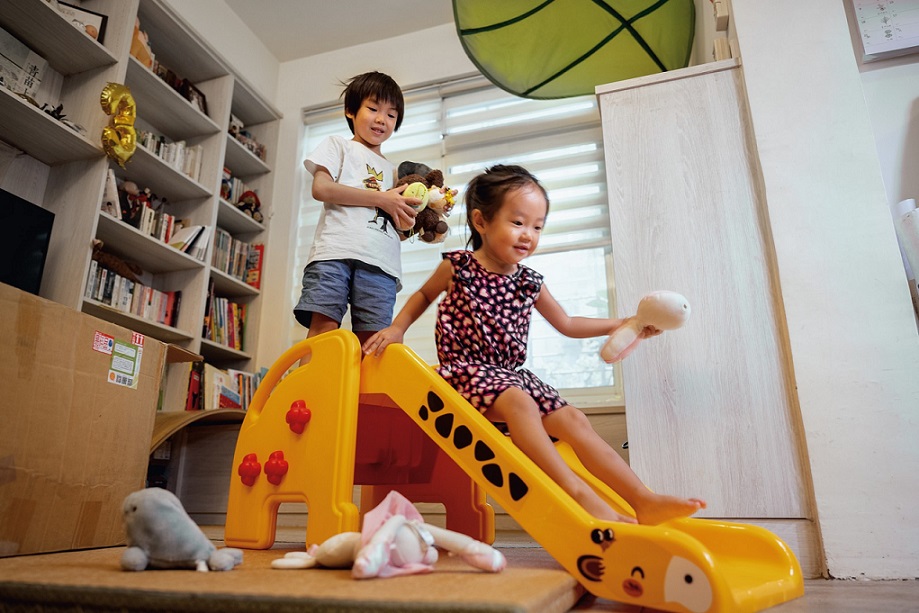
There are never enough toys. However, as children quickly outgrow their toys, rent instead of buy may be a good option. (Photo by Huang Shi-ze)
It is a regular Monday morning. Two girls in their twenties are trying out clothes in front of a mirror. "Is this too casual?" Albeit a very common sight in a fashion store, somehow something is off. "We'll rent these two jumpsuits."
Rent? Yes, the girls are here not to purchase, but to rent clothes. This time is their third time renting, mainly for company events. "For the occasional formal events, renting is perfect," said the girls.
For a long time, we are used to buying and throwing things away. However, now we have an alternative which can not only satisfy our times of need but also maximize the usage of the items.
AMAZE, a renting platform for fashionable clothing, provides a way out for those who are troubled with "not enough clothes" and "not a big enough wardrobe".
"Many of our customers rent dresses from us before a trip, so they can show off clothes they've never worn before in photos," said Zhang Yu-jie (張瑜倢), product manager for AMAZE. From nightclubs, dates, to shareholder meetings, many customers rent clothes online and offline. When the clothes are returned, AMAZE sends them for professional cleaning and sanitizing.
I have heard of wedding dress or cosplay rentals, but now there are rentals for everyday clothing too? How was the market response?
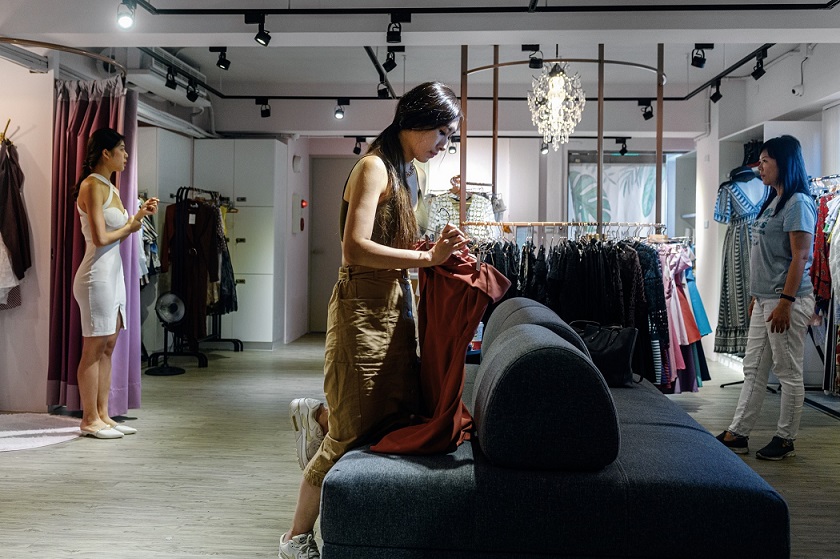
Through AMAZE, customers can satisfy their desire to wear something "new" every day at no expense to the environment.
"The younger generation is more used to sharing. They don't mind if it's used," said Zhang. AMAZE has had 50 thousand rentals since its founding four years ago. Their customers are mostly in the twenties, including some university students. "The platform is like a shared closet."
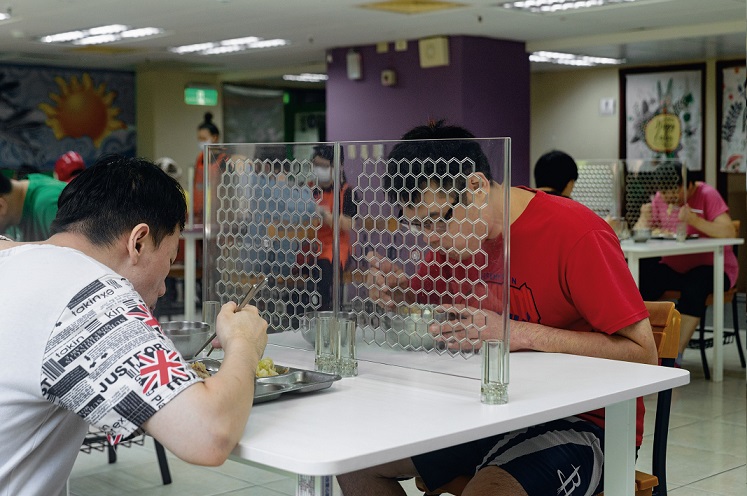
What are we going to do with all the protective screens when the pandemic is over? Luckily, Mangodan will collect back and reuse the screens, so there will be no waste created.
When we talk about rent, we usually think of houses or cars. However, the concept of renting is no longer restricted to highly-priced, long-term leases but has now included low-cost, short-term rentals of clothes, and other items.
In one of the homes for the mentally handicapped in New Taipei City, the protective screens employed in their dining area are actually rented, and will not become rubbish when the pandemic is over. "We had thought of buying, but we found out that these screens can be rented at only a tenth of the price. The supplier will also take back these screens and reuse them, so it's more environmentally friendly," said Zheng Fen-fang (鄭芬芳), director of the home.
Circular Economy
The protective screens are rented from a brand under Mausu Enterprise, Mangodan, which also meant "No more throwing away" in Taiwanese.
Using scrapped wafer cassettes from semiconductor manufacturers, Mangodan recycles them into polycarbonate plastic panels. With recycling and remanufacture in mind, Mangodan designed their end products to be modular so they can be assembled and disassembled with ease.
Why would a company that deals with recycled plastic step into the rental business? Lin Ze-lan (林澤嵐), founder and CEO of Mausu Enterprise, told us that he wanted to maximize the value of resources.
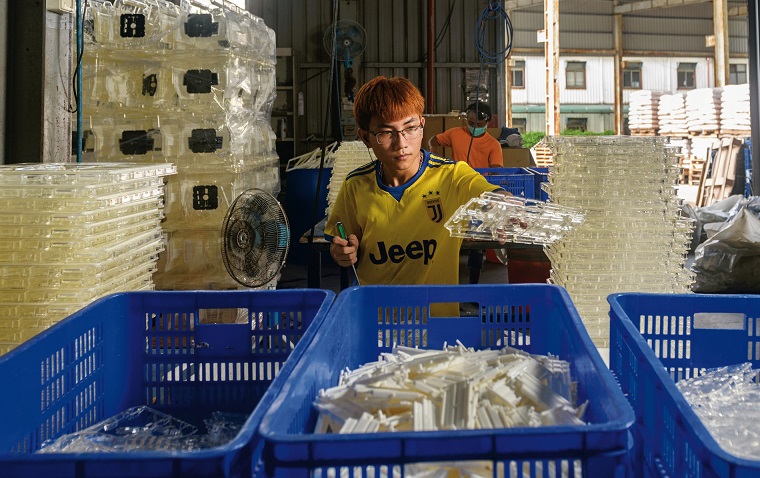
Mangodan uses recycled plastic to produce its products, which can be remade over and over again, forming a loop.
"Why is there still so much rubbish despite our recycling efforts?" Having been in the recycling industry for ten plus years, Lin Ze-lan believed that the problem lies in both the manufacturer and the consumer. One continues to produce, one continues to buy and throw away. "What if we stop throwing away, and allow the product to be reused again and again?" said Lin Ze-lan.
He devised a closed-loop system: manufacture the products using recycled plastic, rent them out, and collect them at the end of customer use. If the returned product is intact, it can be rented out again immediately. If it is damaged beyond repair, it can be crushed and then remade.
"We insist on renting and not selling our products. This can ensure that the resources are recycled, and not incinerated," stressed Lin Ze-lan.
Recently, more and more companies are using innovative business models to promote a circular economy, which can not only generate profits but also reduce resource consumption, a win-win in both economic growth and environmental protection. Under the concept of renting, the seller no longer sells a product but provides a service. The consumer then pays rent to use the item instead of buying and owning it.
"We've just installed a cat tree cum shelving unit for one of our clients. We wish we have more such clients in the future," said Lin Ze-lan. However, he also knows that it is not easy to change people's purchasing habits, so his target customers are those who have short-term shelving needs, such as in an exhibition or newly-opened stores that are limited in funds.
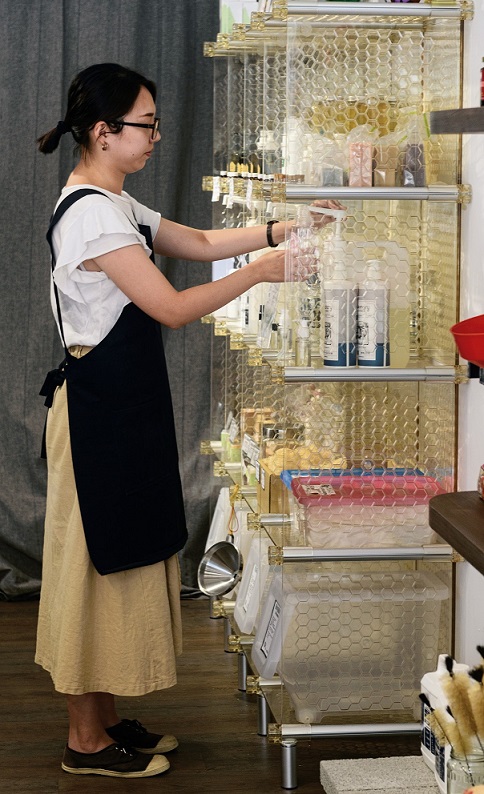
A convenient option for newly-opened stores, Mangodan's rental shelf unit is an example of a sustainable product.
Opened six months ago, a zero-waste, package-free store in New Taipei City displays their detergent products using shelves from Mangodan. The store owner, Xie An-ni (謝安妮), told us that as she did not know how long the store could last, and Mangodan solved her shelving problem. "If my store can survive, I'll continue to rent the shelves to support them," said Xie.
In the past, the idea of "sales equate to growth" has been stimulating consumerism and production, resulting in over-exploitation of resources and huge amounts of waste. However, can "pay-per-use" really help the environment? Will not the sending and collecting of goods also create carbon emissions and packaging waste?
"Yes, but it's still better than manufacturing new products," said Lin Hung-yueh (林宏嶽), associate professor of the Department of Environmental Engineering and Management at Chaoyang University of Technology. He believed that the concept of pay-per-use breaks the chain of production and lowers the impact on the environment by cutting the use of raw resources to make new products.
Furniture for Rent
On the 35th floor of Taipei 101, greenery and wooden furniture create a relaxed atmosphere, and people were seen eating or chatting happily. This is a common space for the office workers in the building. What is so special about this place is that everything you see here, including the tables and chairs, shelves, lighting, decorations, etc, are all rented from IKEA.
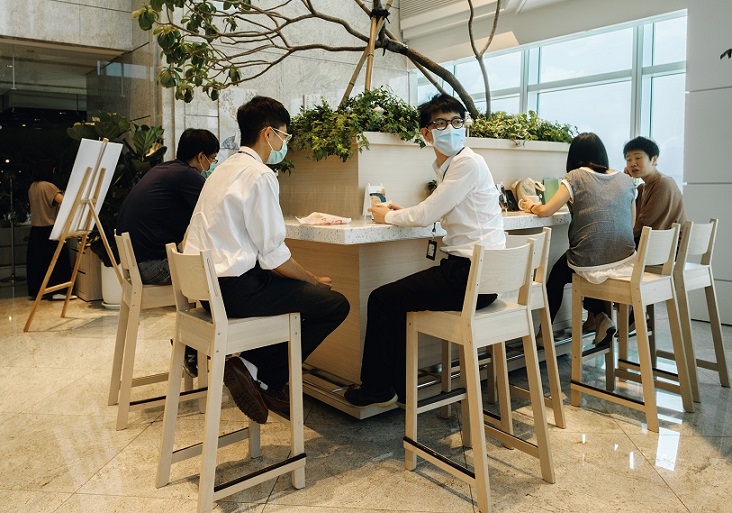
Taipei 101 only needs to pay a monthly fee to enjoy a relaxed space provided and maintained solely by IKEA.
Earlier this year, when Taipei 101 was planning to renovate their common area, they decided to rent what they need, hoping to reduce waste. As IKEA was planning to provide renting service in Taiwan, Taipei 101 became the first client.
In 2019, IKEA announced their move into the furniture rental market. Although they only serve business clients in Taiwan, they are responsible for everything from space planning at the beginning to the collection of furniture when the lease ended, a breakthrough from the traditional model of take-make-waste.
Why would a business choose to rent instead of buying? What are their plans?
Lin Chun-hsu (林俊旭), deputy director of The Center for Green Economy at Chung-hua Institution for Economic Research, pointed out that many brand-conscious enterprises are fulfilling their social responsibility by adopting a more sustainable approach, such as reducing carbon emissions.
From an accounting point of view, it is also more cost-effective for a company to rent instead. With a direct purchase, the item becomes the company's asset, so amortization has to be taken into account. However, rent payment is considered as the company's expenses, so it is better in terms of tax planning.
Through transitioning from selling products to providing rental services, the supplier can also benefit from a greener reputation, but the biggest driving force is still profits.
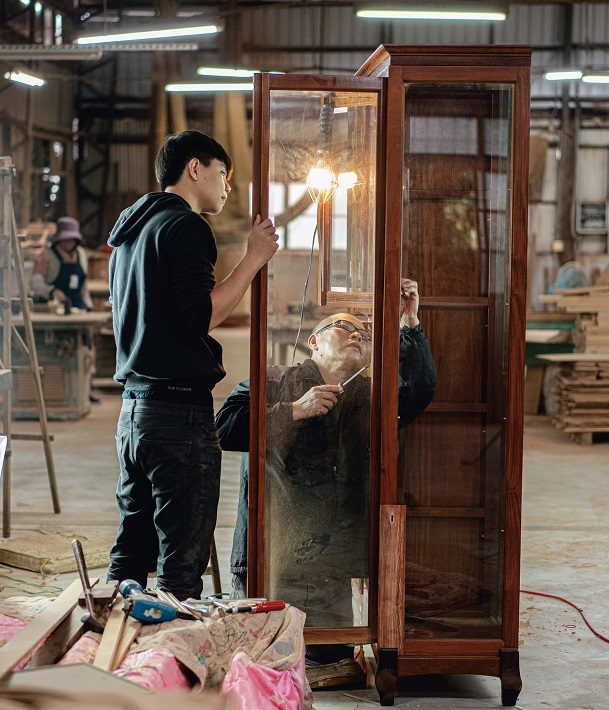
By prolonging and reusing whatever we have, we not only save on our wallets but also save the Earth. (Photo by Tzu Cheng Liu)
Challenges for Rental Services
"In the previous business model where sales are everything, asking the company to extend a product's lifespan and to use environmental-friendly materials is futile. The former reduces profit and the latter increases cost. Who wants to do that?" Lin Hung-yueh pointed out. However, after switching to a pay-per-use business model, it is more cost-saving for the company to bolster its products. If the product is more durable, easier to fix or replace the parts, the company can reduce costs. By also saving on raw materials and waste disposal, the company can earn a higher profit.
Japanese lifestyle retailer, Muji, also stepped into the furniture rental business in July this year. Riding on the trend of sharing, Muji provides rental service in five major cities in Japan. This diversification opens up more opportunities for the retailer to grow and build a long relationship with its customers.
Lin Chun-hsu speculated that, as of now, this business model is more feasible in the B2B (business-to-business) sector than B2C (business-to-consumer). The scale must be big enough to motivate the service provider. It is even better if the supplier possesses R&D (research and development) capabilities, as they can strive to use the resources circularly
Philips Lighting (name changed to Signify in 2018) and Schiphol Airport in the Netherlands signed a fifteen years contract in 2011, where Philips is in charge of the initial lighting designs, the subsequent management and maintenance of the bulbs; the airport pays a monthly fee to enjoy the light produced. Philips even redesigned the LED used and increased its lifespan and also moved the driver outside so it can be easily replaced, thus not needing to replace the whole set.
This example brings out some of the challenges faced by the service provider: can their product design support reusability, and can the firm provide adequate maintenance. Take IKEA for example, the focus on affordability, in turn, sacrifices durability in some of their products, so now they not only have to improve their product quality but also redesign the products to be repairable. They also have to set up a local repair network to close the loop.
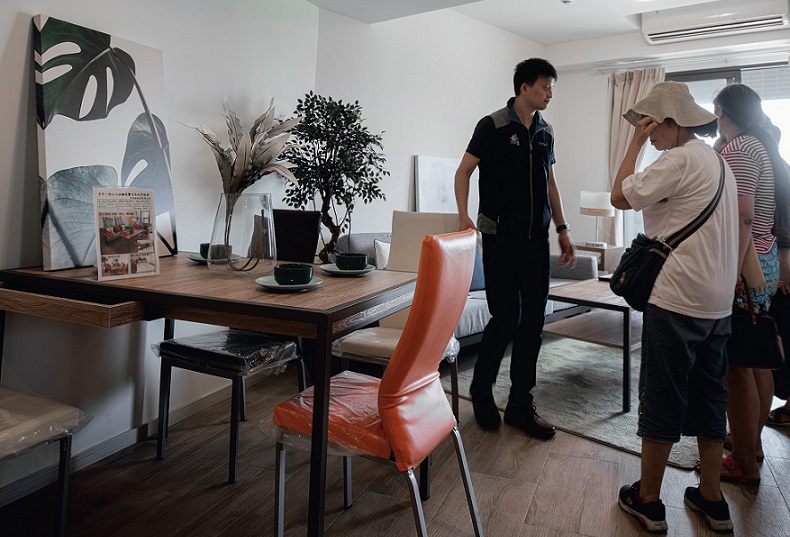
Zhen Wan Guo, a furniture rental service provider in Taiwan, admits that it is still difficult to convince people to rent instead of buy. (Photo by Tzu Cheng Liu)
In Taiwan, furniture rental service has already begun in the eighties when foreign companies flooded in. Started as a furniture manufacturer, Zhen Wan Guo (ZWG), a local company, has been in the rental business for almost half a century.
However, as foreign businesses started pulling out of Taiwan around 2015, furniture rental needs plummeted. ZWG had to look for a new market and turned towards social housing. Currently, they have various clients in three social housing estates in Taipei.
For social housing in Taiwan, a short lease is three years, and a long one can be twelve years, so furniture rental needs should be there. However, Wu Jun-jie (吳俊傑), CEO of ZWG, told us that Taiwanese still prefer to buy their furniture, so the company is still looking for a breakthrough in the market.
Affordable and Eco-friendly Choice
In fact, there are also many other things that are up for rent, not just clothes and furniture.
"We have rented the baby bouncer for close to a year now. The toy kitchenware and the slides are also rented!" Having twin toddlers meant that Pan Yun-zhi's (潘芸芝) house is already overflowing with toys.
"There are never enough toys. It's cheaper to rent them, and also saves space," said Pan. What about hygiene? "Rental Market cleans, disinfects, and shrink wraps (the item), so I'm not very worried. Still, I'll wipe it down with alcohol anyway," laughed Pan.
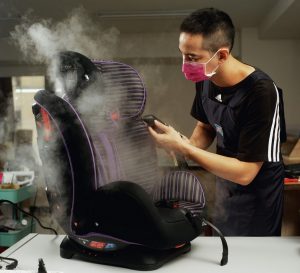
As customers may be worried about the cleanliness and safety of used items, Rental Market always cleans and disinfects beforehand. (Photo by Tzu Cheng Liu)
Rental Market is an online rental platform in Taiwan for everyday items such as toys, assistive devices, home appliances, etc. CEO, Chen Li-fu (陳立夫), shared with us that for items that will be used for a long time, purchasing is good; for items that are of short-term use, such as toys or assistive devices, rent is more convenient and will not result in waste.
Some customers choose to rent a product before they decide to commit. Lee Pei-shan (李佩珊) rents a robot vacuum to see if it is effective against the "ever-present" cat litter in her house. "If it's good, I might consider buying it. If not, I'll end up throwing it away," said Lee bluntly.
Another popular rented product is the breast pump. To find the one most suitable, some mothers rent two pumps at a time, while some try out every different pump. This method is cheaper and more eco-friendly than if they keep buying unsuitable ones.
In three years, Rental Market has built a loyal customer base and service around 1,800 customers in a year. However, Chen confessed that the company still has not broken even as it is a challenge to convince people to rent instead of buy.
At this time and age, probably everyone knows the importance of environmental conservation, but to act upon it is a different matter. As a consumer, if we may only use this item occasionally, or if we only want to try it out, then rent is a better choice. It can satisfy our needs at the moment and enable the product to be continuously being used, thus creating value.
What do we really need in the end? The item or its function?
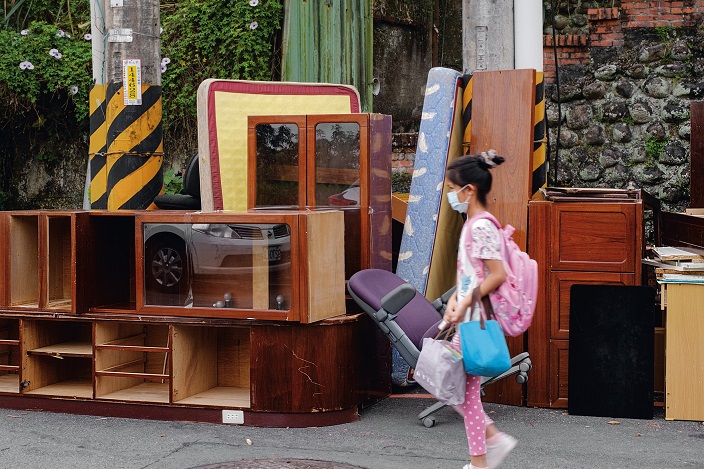
This photo is an example of the consequence of a linear economy: take, make, waste. What are we leaving behind for future generations?
Contact Us | Plan a Visit | Donate
8 Lide Road, Beitou 11259, Taipei, Taiwan
886-2-2898-9999
005741@daaitv.com
©Tzu Chi Culture and Communication Foundation
All rights reserved.
